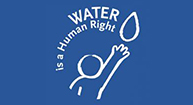New Mantras, Old Problems
 There is a new mantra in the EU water debate: transparency. The European Commission, after ignoring the nearly two million signatures asking for the implementation of the Human Right to Water and Sanitation, is trying to keep people busy by launching a number of bureaucratic initiatives, based on mantras like transparency.
There is a new mantra in the EU water debate: transparency. The European Commission, after ignoring the nearly two million signatures asking for the implementation of the Human Right to Water and Sanitation, is trying to keep people busy by launching a number of bureaucratic initiatives, based on mantras like transparency.
But what does transparency mean? For many private water operators it seems that overflowing people with technical data can be enough. But If I think on what information is important to me, my first thoughts go the quality of the water I am drinking. I would also like to understand my water bill and my taxes, so I can know where my money is going. Is it being invested to improve water infrastructure? In measures to control pollution of our water resources? To guarantee the right to water of those facing economic problems? Or is it going to the shareholders of a multinational company?
Corruption in Water Privatisation
There is another side of the transparency debate that private water operators prefer not to talk about. Citizens in many European countries are extremely tired of corruption scandals related to water privatisation. We discussed a few months ago how in Spain hundreds of politicians are under investigation for bribery, fake invoices, malpractices and nepotism around water concessions granted to AGBAR-SUEZ and FCC. Now the focus is on Veolia, currently under investigation for large-scale corruption in Romania.
This case involves Apa Nova Bucuresti, their Romanian arm, which controls water supply and sewage systems in the capital, Bucharest. The Romanian Anti-Corruption Agency has accused the company of spending millions of euros in bribes to officials in order to drive up the price of water to consumers. It has also accused it of “spying on its employees and buying the silence of the media in Bucharest”.
Water prices in Bucharest have increased by almost 125 percent since 2008. Since Veolia got the contract in 2000, the company has increased the price of tap water 15-fold, while the consumer price index increased fourfold in the same period. The company had a turnover of 170 million euros in 2014, 70 percent higher compared to 2009. This is just one more example of how water privatization is a raw deal for communities.
These recurring problems with water privatisation and corruption are not casual. As stated by Transparency International, “water management, irrigation and dam projects are large, expensive and complex. This makes corruption in procurement and contracts both easy and profitable.”
Enough with the Smoke and Mirrors: Water Is a Human Right
The European Commission is using the debate about transparency as a smokescreen to avoid the real debate citizens are asking for. The European Parliament approved a few weeks ago a resolution calling for the Human Right to Water to be implemented in the EU, calling on water not to be considered as a commodity, but as a common good. And private profits – especially when they involve allegations of corruption – undermine the human right to water.


